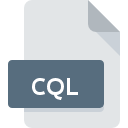
CQL File Extension
XDCC Catcher Queue List
-
DeveloperSiHiDa and balduz
-
Category
-
Popularity0 ( votes)
What is CQL file?
CQL is a file extension commonly associated with XDCC Catcher Queue List files. SiHiDa and balduz defined the XDCC Catcher Queue List format standard. CQL files are supported by software applications available for devices running . Files with CQL extension are categorized as Web Files files. The Web Files subset comprises 303 various file formats. The most popular software that supports CQL files is XDCC Catcher. On the official website of SiHiDa and balduz developer not only will you find detailed information about theXDCC Catcher software, but also about CQL and other supported file formats.
Programs which support CQL file extension
Files with CQL extension, just like any other file formats, can be found on any operating system. The files in question may be transferred to other devices, be it mobile or stationary, yet not all systems may be capable of properly handling such files.
How to open file with CQL extension?
There can be multiple causes why you have problems with opening CQL files on given system. On the bright side, the most encountered issues pertaining to XDCC Catcher Queue List files aren’t complex. In most cases they can be addressed swiftly and effectively without assistance from a specialist. The following is a list of guidelines that will help you identify and solve file-related problems.
Step 1. Get the XDCC Catcher
 Problems with opening and working with CQL files are most probably having to do with no proper software compatible with CQL files being present on your machine. To address this issue, go to the XDCC Catcher developer website, download the tool, and install it. It is that easy Above you will find a complete listing of programs that support CQL files, classified according to system platforms for which they are available. If you want to download XDCC Catcher installer in the most secured manner, we suggest you visit SiHiDa and balduz website and download from their official repositories.
Problems with opening and working with CQL files are most probably having to do with no proper software compatible with CQL files being present on your machine. To address this issue, go to the XDCC Catcher developer website, download the tool, and install it. It is that easy Above you will find a complete listing of programs that support CQL files, classified according to system platforms for which they are available. If you want to download XDCC Catcher installer in the most secured manner, we suggest you visit SiHiDa and balduz website and download from their official repositories.
Step 2. Check the version of XDCC Catcher and update if needed
 You still cannot access CQL files although XDCC Catcher is installed on your system? Make sure that the software is up to date. It may also happen that software creators by updating their applications add compatibility with other, newer file formats. If you have an older version of XDCC Catcher installed, it may not support CQL format. All of the file formats that were handled just fine by the previous versions of given program should be also possible to open using XDCC Catcher.
You still cannot access CQL files although XDCC Catcher is installed on your system? Make sure that the software is up to date. It may also happen that software creators by updating their applications add compatibility with other, newer file formats. If you have an older version of XDCC Catcher installed, it may not support CQL format. All of the file formats that were handled just fine by the previous versions of given program should be also possible to open using XDCC Catcher.
Step 3. Set the default application to open CQL files to XDCC Catcher
If the issue has not been solved in the previous step, you should associate CQL files with latest version of XDCC Catcher you have installed on your device. The method is quite simple and varies little across operating systems.

The procedure to change the default program in Windows
- Choose the entry from the file menu accessed by right-mouse clicking on the CQL file
- Select
- To finalize the process, select entry and using the file explorer select the XDCC Catcher installation folder. Confirm by checking Always use this app to open CQL files box and clicking button.

The procedure to change the default program in Mac OS
- Right-click the CQL file and select
- Open the section by clicking its name
- Select XDCC Catcher and click
- Finally, a This change will be applied to all files with CQL extension message should pop-up. Click button in order to confirm your choice.
Step 4. Check the CQL for errors
Should the problem still occur after following steps 1-3, check if the CQL file is valid. It is probable that the file is corrupted and thus cannot be accessed.

1. Verify that the CQL in question is not infected with a computer virus
If the CQL is indeed infected, it is possible that the malware is blocking it from opening. Scan the CQL file as well as your computer for malware or viruses. CQL file is infected with malware? Follow the steps suggested by your antivirus software.
2. Ensure the file with CQL extension is complete and error-free
If you obtained the problematic CQL file from a third party, ask them to supply you with another copy. The file might have been copied erroneously and the data lost integrity, which precludes from accessing the file. If the CQL file has been downloaded from the internet only partially, try to redownload it.
3. Verify whether your account has administrative rights
Sometimes in order to access files user need to have administrative privileges. Log in using an administrative account and see If this solves the problem.
4. Make sure that the system has sufficient resources to run XDCC Catcher
If the systems has insufficient resources to open CQL files, try closing all currently running applications and try again.
5. Check if you have the latest updates to the operating system and drivers
Latest versions of programs and drivers may help you solve problems with XDCC Catcher Queue List files and ensure security of your device and operating system. It is possible that one of the available system or driver updates may solve the problems with CQL files affecting older versions of given software.
Do you want to help?
If you have additional information about the CQL file, we will be grateful if you share it with our users. To do this, use the form here and send us your information on CQL file.

 Windows
Windows 
